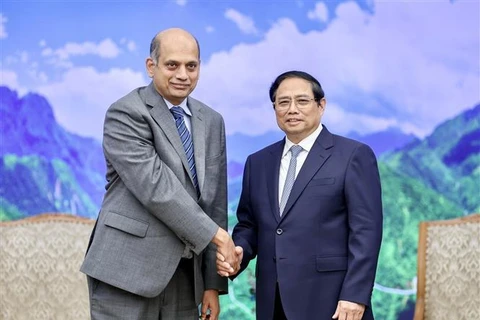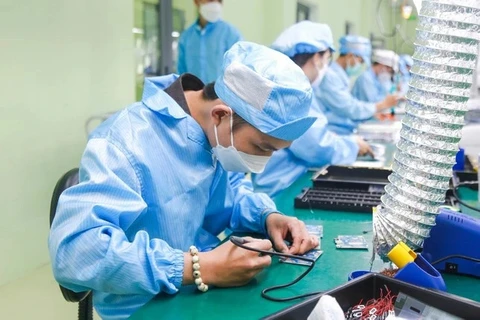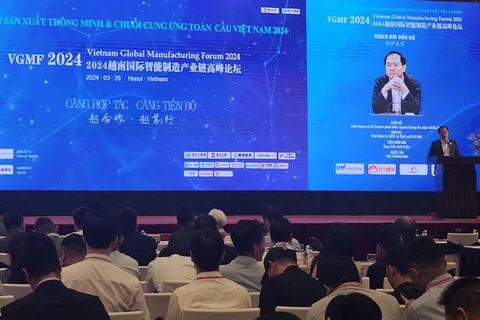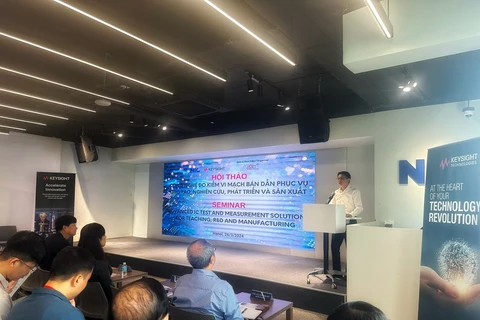Hanoi (VNA) – Vietnam has proved its significant and growing foothold in the semiconductor value chain across ASEAN in recent years, business strategy consulting and operations management firm Tractus wrote in its recent article.
The article noted with a large working-age population and relatively low cost of living, Vietnam boasts a competitive labour cost advantage. “Recognising this potential, the Vietnamese government is actively promoting computer science education, aiming to cultivate 50,000 semiconductor engineers by 2030.”
It added that Vietnam’s booming electronics industry (EI), led by multinational corporations such as Samsung and Daewoo, has played a vital role in a proportional increase in semiconductor materials to fabricate the necessary electronic components. Meanwhile, the adoption of 3D packaging technologies has revolutionised the industry, enhancing performance and energy efficiency. Furthermore, advancements in materials like gallium nitride (GaN) and silicon carbide (SiC) are opening new possibilities.
According to the article, because of the COVID-19 pandemic and US trade restrictions, semiconductor manufacturers are on the lookout for new locations, and Vietnam has emerged as a compelling choice. The Vietnamese government is capitalising on this trend by offering competitive incentives for foreign direct investment (FDI) projects, particularly in high-tech sectors.
Alongside foreign investment, Vietnamese technology companies are actively shaping the future of the industry. Notably, FPT, through its subsidiary FPT Semiconductor, has entered the domestic fabless market.
In conclusion, it wrote: “Vietnam’s strategic location, cost advantages, and burgeoning electronics industry position it as a rising star in the global semiconductor landscape. With government support, technological advancements, and increasing foreign and domestic investments, Vietnam is poised to play a vital role in the future of this critical industry.”/.
The article noted with a large working-age population and relatively low cost of living, Vietnam boasts a competitive labour cost advantage. “Recognising this potential, the Vietnamese government is actively promoting computer science education, aiming to cultivate 50,000 semiconductor engineers by 2030.”
It added that Vietnam’s booming electronics industry (EI), led by multinational corporations such as Samsung and Daewoo, has played a vital role in a proportional increase in semiconductor materials to fabricate the necessary electronic components. Meanwhile, the adoption of 3D packaging technologies has revolutionised the industry, enhancing performance and energy efficiency. Furthermore, advancements in materials like gallium nitride (GaN) and silicon carbide (SiC) are opening new possibilities.
According to the article, because of the COVID-19 pandemic and US trade restrictions, semiconductor manufacturers are on the lookout for new locations, and Vietnam has emerged as a compelling choice. The Vietnamese government is capitalising on this trend by offering competitive incentives for foreign direct investment (FDI) projects, particularly in high-tech sectors.
Alongside foreign investment, Vietnamese technology companies are actively shaping the future of the industry. Notably, FPT, through its subsidiary FPT Semiconductor, has entered the domestic fabless market.
In conclusion, it wrote: “Vietnam’s strategic location, cost advantages, and burgeoning electronics industry position it as a rising star in the global semiconductor landscape. With government support, technological advancements, and increasing foreign and domestic investments, Vietnam is poised to play a vital role in the future of this critical industry.”/.
VNA

























